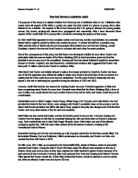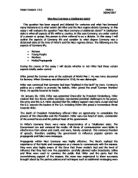Adolf Hitler was also aware that Roehm and the SA had the power to remove him. Hermann Goering and Heinrich Himmler played on this fear by constantly feeding him with new information on Roehm's proposed coup. Their masterstroke was to claim that Gregor Strasser, whom Hitler hated, was part of the planned conspiracy against him. With this news Hitler ordered all the SA leaders to attend a meeting in the Hanselbauer Hotel in Wiesse.
Meanwhile Goering and Himmler were drawing up a list of people outside the SA that they wanted killed. The list included Strasser, Kurt von Schleicher, Hitler's predecessor as chancellor, and Gustav von Kahr, who crushed the Beer Hall Putsch in 1923.
On 29th June, 1934. Hitler, accompanied by the Schutzstaffel (SS), arrived at Wiesse, where he personally arrested Ernst Roehm. During the next 24 hours 200 other senior SA officers were arrested on the way to Wiesse. Many were shot as soon as they were captured but Hitler decided to pardon Roehm because of his past services to the movement. However, after much pressure from Hermann Goering and Heinrich Himmler, Hitler agreed that Roehm should die. At first Hitler insisted that Roehm should be allowed to commit suicide but, when he refused, Roehm was shot by two SS men.
Roehm was replaced by Victor Lutze as head of the SA. Lutze was a weak man and the SA gradually lost its power in Hitler's Germany. The Schutzstaffel (SS) under the leadership of Himmler grew rapidly during the next few years, replacing the SA as the dominant force in Germany.
The purge of the SA was kept secret until it was announced by Adolf Hitler on 13th July. It was during this speech that Hitler gave the purge its name: Night of the Long Knives (a phrase from a popular Nazi song). Hitler claimed that 61 had been executed while 13 had been shot resisting arrest and three had committed suicide. Others have argued that as many as 400 people were killed during the purge. In his speech Hitler explained why he had not relied on the courts to deal with the conspirators: "In this hour I was responsible for the fate of the German people, and thereby I become the supreme judge of the German people. I gave the order to shoot the ringleaders in this treason."
The Night of the Long Knives was a turning point in the history of Hitler's Germany. Hitler had made it clear that he was the supreme ruler of Germany who had the right to be judge and jury, and had the power to decide whether people lived or died.
The Nazi party and Hitler were concerned about how young people were educated because he realised that the best way to keep in control was to change the way people are educated, which would stop any opposition to the party. This meant that when children left school they believed in the Nazi party. Hitler developed an education system and made sure that the next generation had the political and military training that they needed to become soldiers and politicians. He did this by introducing a ‘Hitler Youth,’ which allowed youngsters from the age of 14 – 18 have military training. However, while boys were practising their military skills the girls were to join the ‘Young Maidens’. This was where the girls were taught how to prepare for motherhood at the age of 14. Hitler was also interested in how young people spent their spare time. Hitler set up the ‘Youth Movement’ for boys and girls. This movement taught young people to be loyal to Hitler and the Nazi party; this movement also trained them up for military service and skills required for this. In total there were five organisations for children to join.
Nazi attitudes towards women were not very good. For the Nazi, the main function of women was to bear as many children as possible. The Nazi believed that their job was to stay at home, cooking, looking after the children and go to the church. Even though women stayed at home they were not allowed to do as they liked. They weren’t allowed to wear make-up and wearing trousers was frowned upon. Their hair was to be put in bun or in plaits, but not dyed or permed. They weren’t to be slim because that was not good for childbearing; they were only allowed to have children. Hitler tried to encourage young couples to have children by saying that the government would give all newly married couples a loan of 1000 marks, which was equivalent of nine months wages. The women who were in good jobs were dismissed and only a few were left. They only had a few women left because the rest of them were conceiving or giving birth. The Nazis controlled those women in the home by not allowing them to do what they wanted. When Hitler said that he wished women to stick to the 30’s he meant all they could do was look after children, go to the church and cook.
The Christian church was very important to Hitler and his party. The changes that he bought to the church were that he tried to set up a Reich to replace the protestant churches. He ordered that a copy of ‘Mein Kampf’ and a sword to be placed on the altar, and that only official Nazi speakers to be allowed to preach. The Nazi also set up pagan-style alternative to Christianity called German faith movement. The sale of bibles in Germany was stooped. The church people that spoke out against Hitler were beaten up and put into concentration camps, but there was not much effective opposition in Germany. The sale of bibles was stopped because it taught people to be compassionate and forgive people. The bible did not agree with the Nazi ideas. In Germany people were almost making Hitler God.
Hitler did succeed in reducing unemployment in Germany by the RAD. The RAD was a National Labour service. They gave jobs to men in public working schemes, digging drainage on farms and planting new forests. These were other organisation that helped organise jobs, these were the strength through joy movement, the German labour front and the compulsory military service. Apart from creating new jobs, the Nazi were able to reduce unemployment by not including the Jews and women in unemployment figures, and giving their jobs to unemployed men. The German Labour front took place of the trade unions. Only hardworking members of the Nazi party were given places on the cruise liners. Those who didn’t get a place at the Nazi cruise liners had chance of a walking holiday in the mountains, for one week for 28 marks or during winter a skiing trip in Bravania for 28 marks. People who could afford foreign holidays could travel to Switzerland for 65 marks or Italy for 155 marks for two weeks. The Nazi party also tried to control people’s leisure time. The strength through joy movement organised leisure activities for everyone. Doctor Robert Lay believed Germans had plenty to do in their free time they would be more likely to work harder at their jobs. These included cheap holidays, cheap cars and all sorts of entertainment. All the money workers paid into these schemes went towards making Germany great again.
Goebbels was in charge of propaganda and censorship to control people and get his ideas cross. He used the customs and civilisations of a particular people or group. He controlled newspapers and broadcasters such as, radios, jazz music, art and architecture, which was used to strengthen the look of Hitler and the master race. New buildings were made to show the strength of the regime and last for a thousand of years and finally, swastika were placed on buildings; statues of Hitler began to appear in German towns. He used propaganda which is a form of advertising, it aims to persuade large numbers of people to believe what he wants them to believe censorship is examination of letters, books, films etc, and remove/ban anything regarded as harmful. There were no opposition in Germany, well not any effective opposition.
I have discussed the many ways the Nazi party controlled people and I think they were successful because there was not much opposition in Germany. Even though there was not much opposition but there was a little opposition. Edelweiss Pirates and the swing movement did oppose a little to Hitler. Edelweiss Pirates were working class teenagers. They opposed Hitler by singing songs like the Hitler Youth but changed the lyrics of songs to mock Germany and when they stopped bands of Hitler Youth, they taunted and sometimes attacked them. The swing movement was made up of mainly middle class teenagers. They went to parties where they listened to English and American music. This group opposed Hitler by dancing to American dances like ‘jitter bug’ to banned jazz music. They accepted Jews at their clubs.
As you can see this was not much effective opposition and did not affect Hitler much.
The attitudes of Germans began to change in the early 1940’s and Hitler was planned to be assassinated but he survived. There were anti – Nazi church leaders reappearing, symbols pulled down from buildings and people stopped wearing the Swastika.
In conclusion I think Hitler had complete control and Germany was a totalitarian state.






